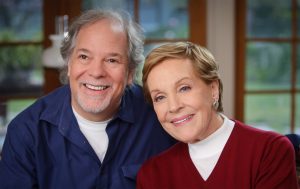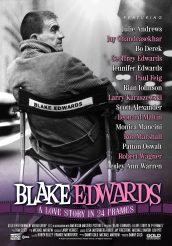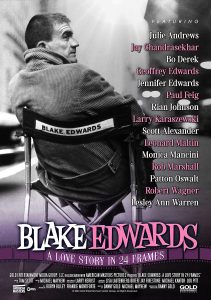
Julie Andrews and Director Danny Gold after their interview for BLAKE EDWARDS: A LOVE STORY IN 24 FRAMES | ©2024 PBS
The feature documentary BLAKE EDWARDS: A LOVE STORY IN 24 FRAMES, premieres on PBS’s AMERICAN MASTERS on Tuesday, August 27. Directed by Danny Gold, the film explores the career and personal life of the celebrated filmmaker, who directed, produced, and/or wrote of co-wrote films spanning in genre from the 1962 drama DAYS OF WINE AND ROSES to the 1963 farce THE PINK PANTHER to the 1982 gender-bending musical VICTOR/VICTORIA.
Edwards was born in 1922 and died in 2010. He was awarded an honorary Oscar in 2004 “in recognition of his extraordinary body of work,” and was Oscar-nominated for his VICTOR/VICTORIA screenplay. Edwards was also known for often directing his wife, Julie Andrews, who participates in the documentary.
Other actors who worked with Edwards who are interviewed for the film include Lesley Ann Warren, Bo Derek, and Robert Wagner. Contemporary filmmakers who cite Edwards as an influence on their own work include Paul Feig and Rian Johnson.
Danny Gold, whose previous documentaries include KILLING ME SOFTLY WITH HIS SONGS (about composer Charles Fox) and IF YOU’RE NOT IN THE OBIT, EAT BREAKFAST (about Carl Reiner and other nonagenarians), directed BLAKE EDWARDS: A LOVE STORY IN 24 FRAMES (the subtitle is a reference to the frame rate of 35-millimeter film).
Michael Kantor, one of BLAKE EDWARDS’s executive producers, is also the executive producer of the AMERICAN MASTERS series on PBS.
During PBS’s portion of the summer Television Critics Association (TCA) press tour in Pasadena, California, the two men sit down together to talk about BLAKE EDWARDS: A LOVE STORY IN 24 FRAMES.
Gold says of Edwards, “Always was a fan. I came to Blake Edwards when I was around twelve, seeing THE RETURN OF THE PINK PANTHER, that was my first Blake Edwards movie, and just fell in love with that. That was my introduction to seeing Peter Sellers, and then that ignited an interest in his films. And then I started discovering Edwards’ past films, but then [going forward], I was able to track the films like 10 and VICTOR/VICTORIA.”
Kantor explains that AMERICAN MASTERS strives to be diverse in the people it highlights. “Our mission is to tell the story of people who’ve impacted our culture. And our culture is not monolithic. It’s not just about sports We told Dr. Anthony Fauci’s story, but it’s not just about medicine or health, it’s about all these different things, and the way that different people have impacted our culture. So, we try and spread as wide a net as possible.
In all cases, Kantor elaborates, “Generally, what we look for from filmmakers is a treatment, which explains, one, why is this subject an American master, what’s their approach, is it going to have a lot of animation, is it going to have re-enactments, is it just verité, following somebody around, a process film? And then, why are they the right person, what’s their connection to it, why do they have special insight? And then, we talk to them about their budget, and make sure there are people who are working with material, so [it won’t be] so expensive that we can’t afford it.
However, Kantor continues, when Gold brought the BLAKE EDWARDS project to AMERICAN MASTERS, “This was a no-brainer. You have Julie Andrews willing to talk about her career with Blake Edwards, and you have Lou Pitt, who managed Blake Edwards, and you have a seasoned filmmaker in Danny Gold, and you have people like [Warren, Derek, Feig, Johnson, et al]. It’s like making a meal. Not to say you can’t screw up a meal, or screw up a film, but with that kind of pantry full of fresh ingredients, you have the makings of something special.”
AMERICAN MASTERS came on board BLAKE EDWARDS in the development stage, Kantor adds. “This was one of those projects where, when Danny suggested it, we were excited from the get-go. From our angle, I just found it so interesting that you had of an iconic director and an iconic performer [Andrews] who were married for four decades, and how was their work together different from their work previous, and how did they work together?
“To his credit, Danny did a great job at digging down and getting Julie in particular to speak about [Edwards and Andrews] meeting through a common therapist, and sort of meet cute on Sunset Boulevard. We always like to contextualize the main character in our films, and not just talk about them, but where in history were they influential, and what’s their legacy, and I think it was really important for us to hear that from Julie.
“What’s interesting is, you have people he had worked with. [When Edwards worked with] Lesley Ann Warren, [as she] was saying, she was a contract player in Hollywood. That’s a very different era from the Paul Feigs and Rian Johnsons, directors today who are approaching comedy in a different way, and what did they take from Blake? That’s sort of at the heart of the film and at the heart of what AMERICAN MASTERS tries to do, which is, again, tell a story with all the different layers. The professional layer, of course; the personal layer to the extent that it informs the professional layer, and the history.”
Gold relates that he didn’t come to BLAKE EDWARDS with preconceived ideas about the director’s varied styles. “I knew [about] that just by watching his movies. What I did learn during the making of the movie was the man, and the background of those films, the autobiographical nature of certain films that he did, and then the importance of family in his life.
“That’s where Julie came in, and their marriage, and then the work they did together. So, I didn’t have any hypothesis going in, other than to explore. I always find, in documentary, at least, that you go in with a general idea of what you’re going to do, but I personally feel you have to keep yourself kind of nimble and open to where the story goes.”
Are there other documentaries about filmmakers that inspired Gold’s approach with BLAKE EDWARDS? “I wouldn’t say it inspired my approach, but one of my favorite documentaries about a filmmaker is THE KID STAYS IN THE PICTURE, about Robert Evans. I like when you can achieve a certain level [of] honesty. To me, making a film about a filmmaker like Blake, or even a movie I made for HBO called THE SUPER BOB EINSTEIN MOVIE, about Albert Brooks’s brother, I don’t want to just say, this happened, then this happened, then this happened. I try to find what is emanating from it, and so that’s what I try to do in making movies.”
As a filmmaker himself, does Gold feel at all intimidated by his subject – that is, does he wonder how Edwards would approach making such a film?
“I would say no, not intimidated by making a film about a filmmaker,” Gold replies. “I think it was finding the balance in the story. There’s so much to talk about with Blake in the amount of time allotted. So, I wouldn’t say that was intimidating; that was challenging. We knew elements of the story that we had to hit. However, when you’re making a documentary, I think, at least for me, other aspects of the story become more important – or, not more important, but resonate more to the story that you’re trying to tell.”
Gold believes BLAKE EDWARDS illustrates how the filmmaker’s work changed as he changed himself.
“As we point out in the film, he was a big fan of the classic comic actors, Laurel and Hardy, Buster Keaton, people like that. So, I think in his DNA, slapstick was really important. What I thought that he did that was very interesting, he reinterpreted slapstick put up to a modern lens. So, when his relationship started with Peter Sellers, boy, did they take that old-style comedy and sort of redefine it, in THE PARTY, in the PINK PANTHER movies.
“And then, as he grew as a person – I don’t want to be presumptuous – as he evolved, or as his career went on, you started seeing movies like S.O.B. or THAT’S LIFE or VICTOR/VICTORIA, 10. It’s like any artist, I think. You grow, or you move in different directions, or you’re not the same person you were when you when you were twenty when you’re making a movie later.”
Gold doesn’t believe that anyone he approached for an interview for the film turned him down. Unfortunately, not only Edwards but many of his close collaborators had passed away by the time the making of the documentary began.
Asked if there was anyone Gold would have liked to interview, he laughs, “Well, Blake would have been nice. But no. I think that what we were able to pinpoint story points with who was available. It was such an honor to get Lesley Ann Warren and Bo Derek and Robert Wagner to comment. They had personal relationships, they were percipient witnesses to him on the set. Also, Rob Marshall is a really important get, because he could speak to when Blake went on Broadway and [Marshall choreographed Edwards’s stage version of] VICTOR/VICTORIA.”
This was, Kantor observes, “Well before Rob Marshall had done CHICAGO [as a director].”
“Yes,” Gold agrees. “And then, Rob was able to tell us how important Blake played in his career later, when he made the transition to becoming an award-winning director.”
Andrews is key to the film, Gold adds. “Obviously, Julie, who can speak to him [as] the man, speak to the relationship, and speak to working together. And that in and of itself was an interesting story, because look what they brought to each other’s careers. They brought their own thing to it. I can’t think of the right word. But they brought their own style.”
Kantor notes that another collaborator who made important contributions to BLAKE EDWARDS does not appear in the film. “One expert that Danny had on his team, who is credited as an executive producer, is Lou Pitt, who was Blake’s manager. So, while it didn’t seem appropriate to put him on screen, I think it’s fair to say he was informing a lot of the choices, based on his own experience with Blake.”
Gold agrees. “That’s a very good point. Lou Pitt was a valuable part of the team, because he was there.”
Kantor adds, “The film would have been good if it had only been about Blake and Julie. But what seems to be appealing to the people who’ve seen the film is that it weaves in all these other stories in a really interesting, with different perspectives.”
Gold conducted all of the interviews for the film himself. Were there any stories he didn’t know beforehand that he found especially interesting?
“Well, there are many stories. I’d read Julie’s [autobiographical] book [Home Work, written with her daughter Emma Hamilton Walton], and I read a lot about a lot of Blake stories. So, some you knew, and some you don’t.
“One story is when they got married, and they were filming their [wedding], and they had some camera problems,” Gold laughs. “But also, I think, Blake’s relationship with the studios at certain points in his career, and again, also, the autobiographical nature of certain movies, I didn’t initially think what’s autobiographical about it.
“And then, you learn. Any time you do a documentary, it’s like a master course in the subject. And I think it’s almost not to go in thinking you know it all, and to learn, to open up and to see where the story takes you. So, I think there were a lot of stories from different people in the casts that worked with him that told stories that were fascinating.”
Gold prepares extensively for his interviews, “but my style of interviewing is a discussion. So, if it goes in other directions, I’m ready. I don’t lock into a list of questions. If they say something amazing, I don’t just go to the next question. So, I try to be very nimble and open with where the conversation goes.”
There is an outline for the film at the beginning, Gold relates, but “it really comes together in editing. There’s a moment in editing that I think the story kind of winks at you.”
BLAKE EDWARDS has an animated opening sequence that resembles Edwards’s own openings for his PINK PANTHER movies. Gold explains, “I wanted to do an homage to Blake Edwards’s openings. They were always really interesting. There was animation, and he had these two guys, [David H.] DePatie and [Fritz] Freleng, who did it, and I wanted to find an animator [Luke Stone] who could homage that style. And then we storyboarded it out, and came up with ideas and, because we did it later in the process, we knew certain things that we were highlighting in the movie that could be resonant, that could play well in the opening.”
Animation was also helpful for sections where footage was scarce. Gold relates, “The animation was informed by the lack of coverage of the story. So, when Julie is telling the story of when they met, or the wedding – in fact, that’s the crux of the story about the wedding, that they hired a couple of camera people, and it was nothing but foul-ups in the equipment, so we took the opportunity to use some animation where we could do that.”
What would Gold and Kantor most like people to know about BLAKE EDWARDS: A LOVE STORY IN 24 FRAMES?
Kantor replies, “It is very much a classic AMERICAN MASTERS, in that it’s looking at a great artist who brought the tools of cinema and filmmaking to bear on his vision of the world, and AMERICAN MASTERS has done a bunch of notable films in that regard – John Ford, John Wayne, Sidney Lumet, and others – so it was naturally appealing from the beginning.”
Gold says, “As far as Blake, I would say that I would like people to know his honesty, in terms of his self-reflection and putting that on the screen, and I found him to be a very brave filmmaker, who ran the panoply of genre and experiences. He started out as a studio guy, and then he explored the independent side of film, too. So, I think that there’s a great story there. I’d love people to be able to watch our film, and then go out and explore his art. I think it’s worthy of it.”
Follow us on Twitter at ASSIGNMENT X
Like us on Facebook at ASSIGNMENT X
Article Source: Assignment X
Article: BLAKE EDWARDS: A LOVE STORY IN 24 FRAMES: Director Danny Gold and executive producer Michael Kantor give the scoop on the new PBS AMERICAN MASTERS documentary
Related Posts:












